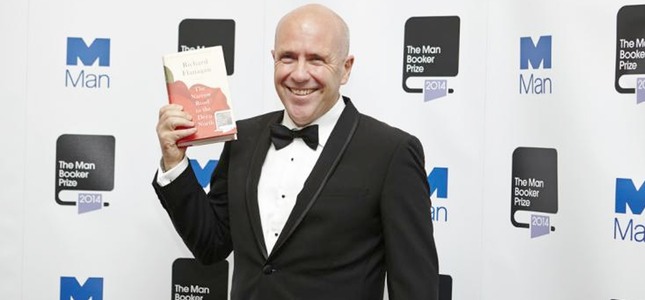
The announcement was broadcast live on the BBC and saw Flanagan taking the top prize, winning a cheque for £50,000 and the trophy, which was presented to him by the HRH The Dutchess Of Cornwall. As one of the most famous writing competitions throughout the world, it a prestigious prize for Tazmanian author, who’s book will undoubtedly be flying off the shelves in the wake of the announcement.
Talking on BBC Radio 4 the morning after the announcement, the 2014 Booker Prize winner commented that it was a book that he felt he had to write having grown up in and amongst the aftermath of the real life events of the Japanese POW camps that the book centres around. With his father, a former prisoner of war veteran who worked on the Death Railway, he had significant inspiration to write the book, and clearly it’s turned out to be one incredible novel as a result.
The story of The Narrow Road To The Deep North focuses on two great bastions of literature throughout history, love and war, as it also investigating the meaning of heroism and the nature of cruelty. It follows the horrific experiences of surgeon Dorrigo Evans, who finds himself in a Japanese POW camp working on the Thailand-Burma railway during the Second World War. While the gruelling reality of his strain in the construction of the railway and his torment by those in charge of the camp are significant, he finds that he’s most troubled by the memory of the love affair he had with his uncle’s young wife two years earlier.
Richard Flanagan took the prize having come out on top of the 2014 Booker Prize shortlist, beating out previous winner Howard Jacobson and his strange book J, as well as previous shortlisted novelist Ali Smith’s recent release, How To Be Both. The other books in the shortlist included Joshua Ferris’ To Rise Again at a Decent Hour, Karen Joy Fowler’s We Are All Completely Beside Ourselves, and Neel Mukherjee’s The Lives of Others.
The announcement of Richard Flanagan as the 2014 Booker Prize winner was made by this year’s Chair Of Judges, philosopher and author AC Grayling, who along with the rest of the panel of judges by – Jonathan Bate, Sarah Churchwell, Daniel Glaser, Alastair Niven, and Erica Wagner – oversaw the competition throughout the longlist, shortlist and winning novel process that we’ve become accustomed to.
Though the 2014 prize in particular came under fire as a result of the lack of diversity in the previous stages of the competition, it looks like the winning book is considered a fitting decision by the judges. To find out more about all of the authors that started out in the competition, and why there was so much controversy, visit our 2014 Booker Prize longlist page.


